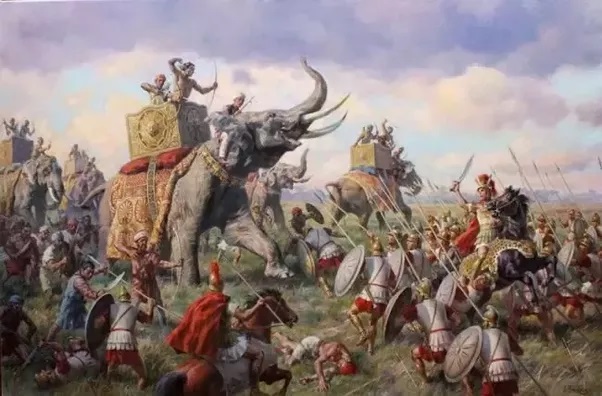"I do not pilfer victory." - Alexander the Great
The Battle of the Hydaspes (326 BC) was the last major battle of Alexander the Great. A truly remarkable battle, fought near the end of the known world in modern day Pakistan, the battle resulted in a decisive Macedonian victory over King Porus and the surrender of the Paurava kingdom in India.
Today however, that narrative is being challenged by Indian professors, army generals, Pakistani bloggers, defense writers, and Indian nationalists who say the primary sources have it all wrong, Alexander was defeated at the Hydaspes and was forced to end his Indian campaign after fighting King Porus to a draw. Lending support to this theory, whose name is enough to elicit an eyebrow or two, is Marshal Gregory Zhukov of the USSR, who is reportedly to have claimed that Alexander had “failed to gain position” in India.
While many of the above challenges to the established narrative are easily explained when viewed through a nationalist lens, perhaps Alexander's disputed withdraw is enough to warrant a cautious return to the source material.
What then happened at the Battle of the Hydaspes? Is there enough evidence to prove that Porus defeated Alexander? And why was this the last great battle of Alexander the Great?
The Case Against Alexander
The revisionist case against Alexander almost certainly begins with Alexander’s withdraw from India. If Alexander won the Battle of the Hydaspes, -so say the revisionists-, and did so decisively, why did he ultimately turn back? An undefeated army, made up now of mostly mercenaries, does not get homesick, and what lay ahead was still the heart of India, including large powerful Indian tribes who -if left unconquered- could threaten Alexander’s holdings around the Indus river valley. Its here of course, where revisionists make their stand, quoting both Plutarch, and more importantly, Megasthenes, who themselves say Alexander’s army was afraid of advancing further for fear of confronting the Nanda Empire and its armies that consisted of thousands of war elephants. This fear of combating Indian war elephants, as one might expect, is linked back to the Battle of the Hydaspes, and the losses Alexander likely sustained in his battle against Porus.
While we don’t know the exact number of Macedonian casualties, many historians agree that the battle was uniquely costly, especially to the Macedonian phalanx and cavalry. If Theodore Dodge is to be believed, then the Macedonian army likely suffered over 10,000 casualties (killed or wounded). An astonishing number, once we consider that this was 73% of Alexander’s attacking force. [1] If true, it would seem at least credible, to revisionists as well as objective historians, that unique combat losses to the core of Alexander’s army made the army less incline to advance further into India. If Porus had 100 war elephants and was able to inflict 10,000 casualties to Alexander’s best troops, just imagine then what 6,000 elephants could do.
Though the withdrawal and suspected mauling of the Macedonian army in India is the essential enabler to this debate (because a completely conquered India would obviously mean no case), to get from victory to defeat at the Hydaspes river requires challenging the general narrative put forward by Greek and Roman historians. Here, the 2nd half of the revisionist argument rests on attacking the credibility of the existing sources and the conclusions reached by European historians. For this, they claim both bias and European colonialism, while also offering new interpretations; based on alternative texts and battle analysis.
For starters:
- How does Coenus complete a circuit around Porus’s army in time to deliver a decisive blow when Porus’s army occupies a 4 to 5 mile front. How also does Alexander know, prior to giving his orders to Coenus, that Porus will move all his cavalry to his left wing? [2]
- How does Alexander win when he is outnumbered at least 2:1 in infantry, and 5:1 when counting only the phalanx? How does an attacking army win against such odds?
- How does Alexander cross the Hydaspes river with less ships then he used to cross the Hellespont?
- With no surviving contemporary accounts of the battle to go on, why dismiss the Alexander Romance as a source? Ethiopic texts, translated by E.A.W. Badge, say Alexander lost the Battle of the Hydaspes.
- Why are Muslim, Persian, Arab, and Turkish texts less credible than those produced by hero worshipping Europeans?
- Why trust the routes Alexander used in India, when they were mapped originally by British surveyors who had an interest in discovering new trade routes for the British East India Company, along with invasion routes that could be used by the Russian military.
- Why are there no accounts of the Macedonian army carrying booty through India, and why does a mad man like Alexander not seek revenge for the death of his horse?
- Why is Porus seemingly rewarded after the Battle of the Hydaspes? And why is he left in power?
- Why is Alexander not mentioned in any Indian text. Where are the cities and monuments he founded? And why is Macedonian influence east of the Indus river valley seemingly short lived?
Altogether these arguments help create a new narrative that Alexander was defeated at the Battle of the Hyadespes, and that Greek and Roman historians were lying. After being forced to withdraw from India, Alexander thus produced the famed Elephant Medallions, no doubt an early form of propaganda where he claims to have defeated an elephant army led by Porus, which of course, is just another continuation in the incredible history of Alexander, written purposely by historians to inspire awe, wonder, and obedience. With so many holes and inconsistencies in the mythology of Alexander however, why would there not be room for a revisionist argument?
Elephant Medallions from Babylon.
Possibly 324 B.C.E.
Defending the Narrative
Though revisionists are right to point out to historians that no Indian accounts of the battle have been found, the fact remains, the invasion of India is a highly sourced event in the history of Alexander, backed by collaborating sources, including those independent of Alexander’s campaigns. Porus, for instance, appears in more than one history not related to Alexander, as do the monuments Alexander left behind at the Beas river prior to leaving India. While still not yet discovered, Bucephala and Nicaea are referred to in Roman geographical surveys, conducted many centuries after Alexander. The former city of Bucephala (which Alexander founded) even appears in the Peutinger Table, which is likely a copy of a Roman road map. The fact that Porus is mentioned in the Partition of Babylon, and again at Triparadisus, means, quite literally, that Alexander did not submit to Porus. And while archeological evidence remains sketchy at best, revisionists must still explain evidence of Greek influence, to include stone building and religious art as far away as Madurai. Would the future presence of the Indo-Greeks around Taxila, Sirkap, and elsewhere, to include also the rapid rise of the Maurya Empire into North-Western India, have been possible had Alexander lost the Battle of the Hyadspes? And though technically correct to question the battle narrative and its many falsehoods, a reasonable analysis still gives Alexander a sufficient chance at victory. If Alexander is able to destroy Porus’s cavalry or bring Craterus and Meleager into battle behind Porus’s lines, he wins. Given an 8-hour battle (as claimed by Plutarch), this is likely what happened.
Finally, perhaps the most glaring and most painfully obvious elephant in the room is the charge of Indian nationalism. While holes and questions in the narrative put forward by Europeans allow for alternative hypotheses, the fact remains, much of the intellectual basis of what we know about ancient India comes from the very sources revisionists accuse of lying. The great Indian king Ashoka is mentioned more in Greek sources than he is in Indian ones, and though history is often written incorrectly by the victors, the lack of comparable Indian sources does not give revisionists permission to write an uncontested political history of India. Their case must acknowledge the limits of theory and speculation, and all good theory must be unified, consistent, and open to the possibility of being tested.
The line between interesting speculation and valid historical argument is wide.
Did Porus Defeat Alexander?
The answer as to whether Porus actually defeated Alexander the Great is a resounding no. The fact that Alexander is believed to have campaigned in India for another 8 months following the Battle of the Hydaspes is not consistent with any argument that says Porus had defeated Alexander. However, it is also reasonably safe to conclude that Alexander did not conqueror India. The fact that Alexander’s venture is still said to have been short lived, and the rapid collapse of Greek and Macedonian influence following his immediate death, means his invasion into the heart of India was by no means complete or extensive, which is no doubt a source for Zhukov's thesis and many competing histories.
In the end, the collapse of Macedonian morale at the Beas river means Alexander had likely suffered a Pyrrhic victory at the hands of Porus. Porus was thus kept alive and made a satrap out of necessity. An unbelievable act of self-restraint, but reluctant acceptance of the limitations India had imposed on a man who had none. During his mad quest to reach the Eastern sea, Alexander battled many Alexanders, and among the Asian peoples, the Indians were said to have been the bravest. It is no doubt true, had he continued beyond the Beas, he would eventually have met his end. The armies and distances beyond were too great, and the challenges too much. Among the foes still left unconquered were the actual victors of the Battle of the Hydaspes, standing in quiet but historic opposition to the son of Zeus. The biggest and most crucial mistake Alexander could have made would have been to have insisted that he had in fact won any battles at all.
.....
[1]Appendix B: Losses in Some Ancient Battles
Alexander: A History of the Origin and Growth of the Art of War …, Volume 1
By Theodore Ayrault Dodge.
[2] Coenus's circuit:
Spoiler Alert, click show to read:












 Reply With Quote
Reply With Quote




























